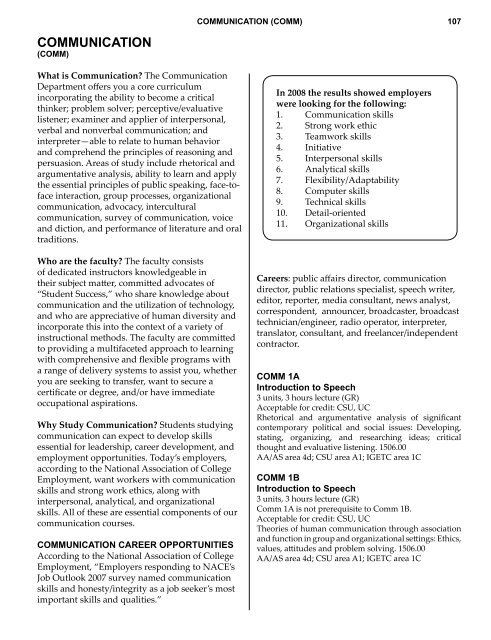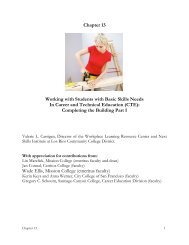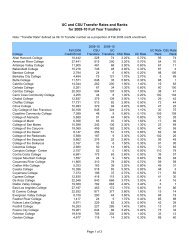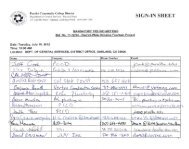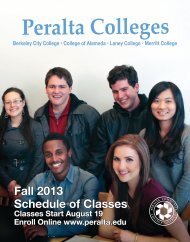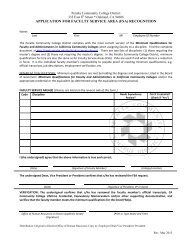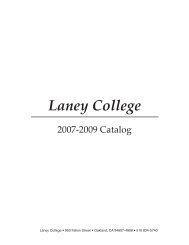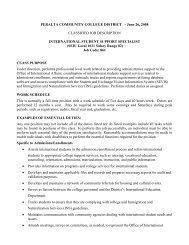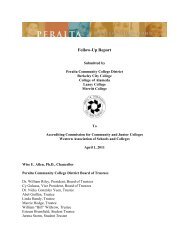106CHINESE CHIN)CHINESE(CHIN)CHIN 10AElementary Cantonese A5 units, 5 hours lecture (GR)Course is equivalent to two years of high school study.Acceptable for credit: CSU, UCIntroductory study and practice of basic language skillsand related Chinese cultural contexts: Basic vocabularyand structures in cultural contexts. <strong>11</strong>07.00AA/AS area 3; CSU area C2; IGETC LanguageCHIN 10BElementary Cantonese B5 units, 5 hours lecture (GR)Prerequisite: Chin 10AAcceptable for credit: CSU, UCContinuation of CHIN 10A with further study andpractice of basic language skills and related Chinesecultural contexts: Grammar and vocabulary building.<strong>11</strong>07.00AA/AS area 3; CSU area C2; IGETC area 3CHIN <strong>11</strong>AIntermediate Cantonese A5 units, 5 hours lecture (GR)Prerequisite: Chin 10BAcceptable for credit: CSU, UCIntermediate level study and practice of all basiclanguage skills: Grammar and vocabulary building,exploration of Cantonese structure, and growth incultural understanding. <strong>11</strong>07.00AA/AS area 3; CSU area C2; IGETC area 3CHIN <strong>11</strong>BIntermediate Cantonese B5 units, 5 hours lecture (GR)Prerequisite: Chin <strong>11</strong>AAcceptable for credit: CSU, UCContinuation of CHIN <strong>11</strong>B with further study andpractice of all basic language skills: Grammar, vocabularybuilding, language structure and use, and furtherknowledge of cultural understanding and appreciation.<strong>11</strong>07.00AA/AS area 3; CSU area C2; IGETC area 3CHIN 12AAdvanced Cantonese Reading and Writing:Modern and Classical Literature5 units, 5 hours lecture (GR)Prerequisite: Chin <strong>11</strong>BAcceptable for credit: CSU, UCIntroduction to modern and classical poems and otherliterary forms such as novels, prose, drama and songs:Literary-cultural analysis, theories of literary writingand styles, and writing skills; exploration of Chinesehistory and art. <strong>11</strong>07.00AA/AS area 3; CSU area C2; IGETC area 3CHIN 12BAdvanced Cantonese Reading and Writing:Modern and Classical Literature5 units, 5 hours lecture (GR)Prerequisite: Chin 12AAcceptable for credit: CSU, UCContinuation of modern and classical poems and otherliterary forms such as novels, prose, drama, and song:Literary-cultural analysis, theories of literary writingand styles, and reading and writing skills; exploration ofChinese history and art. <strong>11</strong>07.00AA/AS area 3; CSU area C2; IGETC area 3CHIN 30AConversational Cantonese A5 units, 5 hours lecture (GR)Acceptable for credit: CSUIntroduction to conversational Cantonese: Listening,speaking and grammar skills; systematic practice ofeveryday topics of conversation; enhancement of culturalawareness. <strong>11</strong>07.00CHIN 30BConversational Cantonese B5 units, 5 hours lecture (GR)Prerequisite: Chin 30AAcceptable for credit: CSUContinuation of CHIN 30A: Further development oforal comprehension skills as well as additional growthin cultural awareness. <strong>11</strong>07.00
COMMUNICATION(COMM)COMMUNICATION (COMM)107What is Communication? The CommunicationDepartment offers you a core curriculumincorporating the ability to become a criticalthinker; problem solver; perceptive/evaluativelistener; examiner and applier of interpersonal,verbal and nonverbal communication; andinterpreter—able to relate to human behaviorand comprehend the principles of reasoning andpersuasion. Areas of study include rhetorical andargumentative analysis, ability to learn and applythe essential principles of public speaking, face-tofaceinteraction, group processes, organizationalcommunication, advocacy, interculturalcommunication, survey of communication, voiceand diction, and performance of literature and oraltraditions.Who are the faculty? The faculty consistsof dedicated instructors knowledgeable intheir subject matter, committed advocates of“Student Success,” who share knowledge aboutcommunication and the utilization of technology,and who are appreciative of human diversity andincorporate this into the context of a variety ofinstructional methods. The faculty are committedto providing a multifaceted approach to learningwith comprehensive and flexible programs witha range of delivery systems to assist you, whetheryou are seeking to transfer, want to secure acertificate or degree, and/or have immediateoccupational aspirations.Why Study Communication? Students studyingcommunication can expect to develop skillsessential for leadership, career development, andemployment opportunities. Today’s employers,according to the National Association of CollegeEmployment, want workers with communicationskills and strong work ethics, along withinterpersonal, analytical, and organizationalskills. All of these are essential components of ourcommunication courses.COMMUNICATION CAREER OPPORTUNITIESAccording to the National Association of CollegeEmployment, “Employers responding to NACE’sJob Outlook 2007 survey named communicationskills and honesty/integrity as a job seeker’s mostimportant skills and qualities.”In 2008 the results showed employerswere looking for the following:1. Communication skills2. Strong work ethic3. Teamwork skills4. Initiative5. Interpersonal skills6. Analytical skills7. Flexibility/Adaptability8. Computer skills9. Technical skills10. Detail-oriented<strong>11</strong>. Organizational skillsCareers: public affairs director, communicationdirector, public relations specialist, speech writer,editor, reporter, media consultant, news analyst,correspondent, announcer, broadcaster, broadcasttechnician/engineer, radio operator, interpreter,translator, consultant, and freelancer/independentcontractor.COMM 1AIntroduction to Speech3 units, 3 hours lecture (GR)Acceptable for credit: CSU, UCRhetorical and argumentative analysis of significantcontemporary political and social issues: Developing,stating, organizing, and researching ideas; criticalthought and evaluative listening. 1506.00AA/AS area 4d; CSU area A1; IGETC area 1CCOMM 1BIntroduction to Speech3 units, 3 hours lecture (GR)Comm 1A is not prerequisite to Comm 1B.Acceptable for credit: CSU, UCTheories of human communication through associationand function in group and organizational settings: Ethics,values, attitudes and problem solving. 1506.00AA/AS area 4d; CSU area A1; IGETC area 1C
- Page 3 and 4:
2009-2011 CATALOG555 Ralph Appezzat
- Page 6 and 7:
College of Alameda AdministrationOf
- Page 8 and 9:
telephone numbersTelephone NumbersC
- Page 10 and 11:
ACADEMIC CALENDARFall Semester 2009
- Page 12 and 13:
10WELCOME!Who we are, what we do,an
- Page 14 and 15:
12WELCOME TO COLLEGE OF ALAMEDA•
- Page 16 and 17:
14GENERAL INFORMATIONCampus........
- Page 19 and 20:
GENERAL INFORMATION17Accuracy State
- Page 21 and 22:
College InformationCollege INFORMAT
- Page 23 and 24:
College INFORMATION21Returned check
- Page 25 and 26:
College INFORMATION23matriculation
- Page 27 and 28:
College INFORMATION25Exención del
- Page 29 and 30:
College INFORMATION27
- Page 31 and 32:
College INFORMATION29College HourTh
- Page 33 and 34:
STUDENT FINANCIAL AID31General Stat
- Page 35 and 36:
student financial aid33Financial Ai
- Page 37:
35• A student may repeat a course
- Page 41 and 42:
services FOR STUDENTS39Intercollegi
- Page 43 and 44:
services FOR STUDENTS41ASCOA is loc
- Page 45 and 46:
services FOR STUDENTS43basis. The e
- Page 47 and 48:
Degrees and ProgramsDEGREES AND PRO
- Page 49 and 50:
DEGREES AND PROGRAMS47communication
- Page 51 and 52:
DEGREES AND PROGRAMS49College of Al
- Page 53 and 54:
DEGREES AND PROGRAMS51University of
- Page 55 and 56:
DEGREES AND PROGRAMS532009-2010 Cal
- Page 57 and 58: DEGREES AND PROGRAMS55Intersegmenta
- Page 59 and 60: DEGREES AND PROGRAMS57Students who
- Page 61 and 62: Vocational/Technical programs offer
- Page 63 and 64: AREAS OF STUDY FOR DEGREES & CERTIF
- Page 65 and 66: Description of CoursesDescription o
- Page 67 and 68: african-american studies (afram)65A
- Page 69 and 70: anthropology (anthr)67ANTHR 1Introd
- Page 71 and 72: Apparel Design & Merchandising (ADA
- Page 73 and 74: Apparel Design & Merchandising (ADA
- Page 75 and 76: apprenticeship program (appr)73APPR
- Page 77 and 78: apprenticeship program (appr)75APPR
- Page 79 and 80: art (art)77Degree Major Requirement
- Page 81 and 82: ARTS AND HUMANITIES - asian/asian-a
- Page 83 and 84: AUTO BODY AND PAINT(AUTOB)auto body
- Page 85 and 86: AUTOMOTIVE TECHNOLOGY(ATECH)automot
- Page 87 and 88: automotive technology (atech)85Driv
- Page 89 and 90: automotive technology (atech)87ATEC
- Page 91 and 92: aviation MAINTENANCE TECHNOLOGY (AM
- Page 93 and 94: aviation MAINTENANCE TECHNOLOGY (AM
- Page 95 and 96: AVIATION OPERATIONS(AVIAO)AVIATION
- Page 97 and 98: BIOLOGY (BIOL)95Instructor Ann Kirc
- Page 99 and 100: usiness (bus)97BUSINESS(BUS)There a
- Page 101 and 102: usiness (bus)99Certificate of Achie
- Page 103 and 104: usiness (bus)101BUS 49Independent S
- Page 105 and 106: usiness (bus)103BUS 236Records Mana
- Page 107: CHEMISTRY (CHEM)105CHEM 50Beginning
- Page 111 and 112: COMPUTER INFORMATIONSYSTEMS(CIS)com
- Page 113 and 114: computer information systems (CIS)1
- Page 115 and 116: computer information systems (CIS)1
- Page 117 and 118: computer information systems (CIS)1
- Page 119 and 120: COUNSELING(COUN)COUNSELING (COUN)11
- Page 121 and 122: DANCE (DANCE)119DANCE(DANCE)DANCE 1
- Page 123 and 124: DENTAL ASSISTING(DENTL)DENTAL ASSIS
- Page 125 and 126: DENTAL ASSISTING (DENTL)123DENTL 22
- Page 127 and 128: DENTAL ASSISTING (DENTL)125DENTL 22
- Page 129 and 130: DIESEL MECHANICS (DMECH)127Degree M
- Page 131 and 132: DIESEL MECHANICS (DMECH)129DMECH 49
- Page 133 and 134: ENGLISH(ENGL)english (ENGL)131The A
- Page 135 and 136: english (ENGL)133ENGL 49Independent
- Page 137 and 138: english (ENGL)135ENGL 268BBasic Rea
- Page 139 and 140: ENGLISH AS A SECOND LANGUAGE (ESL)1
- Page 141 and 142: FOREIGN LANGUAGEs(FLANG)FOREIGN LAN
- Page 143 and 144: GEOGRAPHY(GEOG)GEOGRAPHY (GEOG)141W
- Page 145 and 146: GERMAN (GERM)143GERMAN(GERM)GERM 1A
- Page 147 and 148: HISTORY(HIST)HISTORY (HIST)145To st
- Page 149 and 150: HISTORY (HIST)147HIST 12History and
- Page 151 and 152: HUMANITIES(HUMAN)HUMANITIES (HUMAN)
- Page 153 and 154: HUMANITIES (HUMAN)151HUMAN 51CLatin
- Page 155 and 156: LEARNING RESOURCES (LRNRE)153LRNRE
- Page 157 and 158: LIBERAL ARTSLIBERAL ARTS155The Libe
- Page 159:
LIBERAL ARTS157M/LAT 18B History an
- Page 162 and 163:
160 LIBERAL ARTSNote: Students must
- Page 164 and 165:
162 MATHEMATICS (MATH)MATHEMATICS(M
- Page 166 and 167:
164 MATHEMATICS (MATH)MATH 49Indepe
- Page 168 and 169:
166MEXICAN AND LATIN-AMERICAN STUDI
- Page 170 and 171:
168 MUSIC (MUSIC)MUSIC(MUSIC)In stu
- Page 172 and 173:
170 MUSIC (MUSIC) - NATURAL SCIENCE
- Page 174 and 175:
172 PHILOSOPHY (PHIL)PHIL 10Logic3
- Page 176 and 177:
174 PHYSICAL EDUCATION (PE)PE 2Aero
- Page 178 and 179:
176 PHYSICAL SCIENCE (PHYSC)PHYSICA
- Page 180 and 181:
178 POLITICAL SCIENCE (POSCI)POLITI
- Page 182 and 183:
180PSYCHOLOGY(PSYCH)PSYCHOLOGY (PSY
- Page 184 and 185:
182social and behavioralsciencesSee
- Page 186 and 187:
184SPANISH(SPAN)SPANISH (SPAN)The A
- Page 188 and 189:
186VIETNAMESE(VIET)VIETNAMESE (VIET
- Page 190 and 191:
188 ACADEMIC REGULATIONS, POLICIES
- Page 192 and 193:
190 ACADEMIC REGULATIONS, POLICIES
- Page 194 and 195:
192ACADEMIC REGULATIONS, POLICIES A
- Page 196 and 197:
194 ACADEMIC REGULATIONS, POLICIES
- Page 198 and 199:
196ACADEMIC REGULATIONS, POLICIES A
- Page 200 and 201:
198 district policies and procedure
- Page 202 and 203:
200district policies and procedures
- Page 204 and 205:
202district policies and procedures
- Page 206 and 207:
204district policies and procedures
- Page 208 and 209:
206 district policies and procedure
- Page 210 and 211:
208 district policies and procedure
- Page 212 and 213:
210 district policies and procedure
- Page 214 and 215:
212 district policies and procedure
- Page 216 and 217:
214 district policies and procedure
- Page 218 and 219:
216district policies and procedures
- Page 220 and 221:
218 district policies and procedure
- Page 222 and 223:
220district policies and procedures
- Page 224 and 225:
222 district policies and procedure
- Page 226 and 227:
224 faculty/staffCamara, JoeCollege
- Page 228 and 229:
226 faculty/staffLeonard, MimiEngli
- Page 230 and 231:
228 faculty/staffScott, Bishop T.Ps
- Page 232 and 233:
230indexIndexAAbility to Benefit...
- Page 234 and 235:
232 indexDue Process:Student Conduc
- Page 236 and 237:
234 indexPrograms Offered at Other
- Page 238 and 239:
236 MapsCampus MapBuilding GuideA 1


